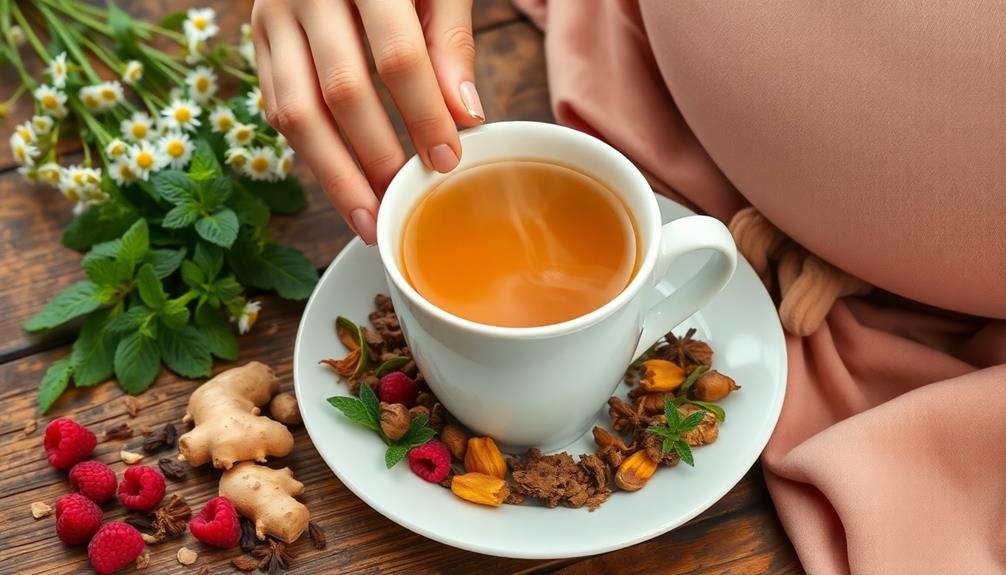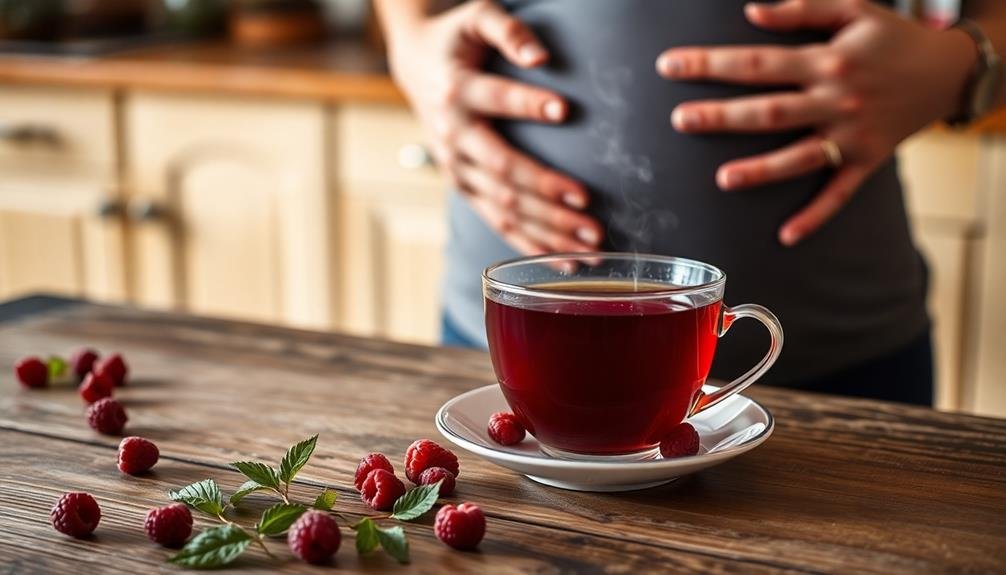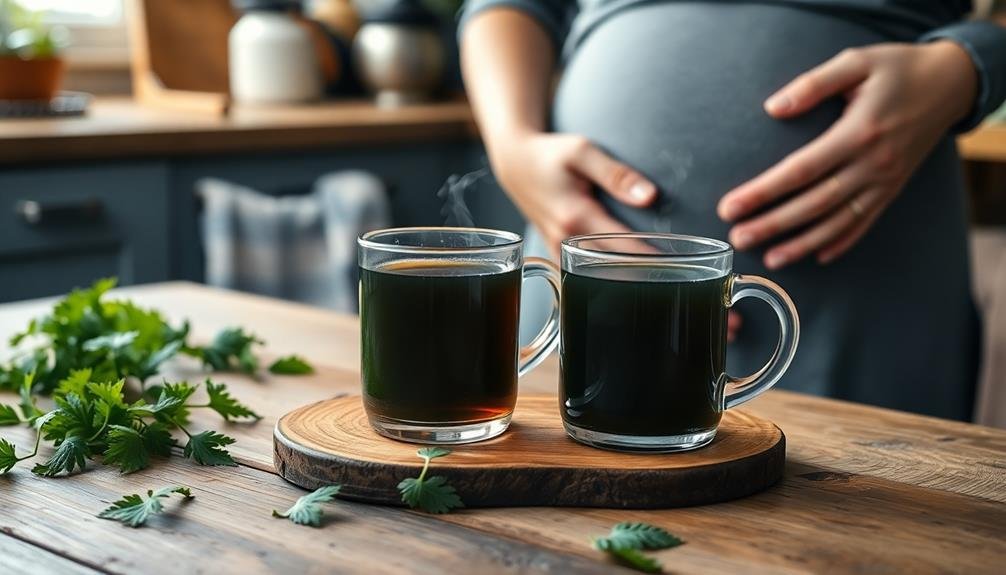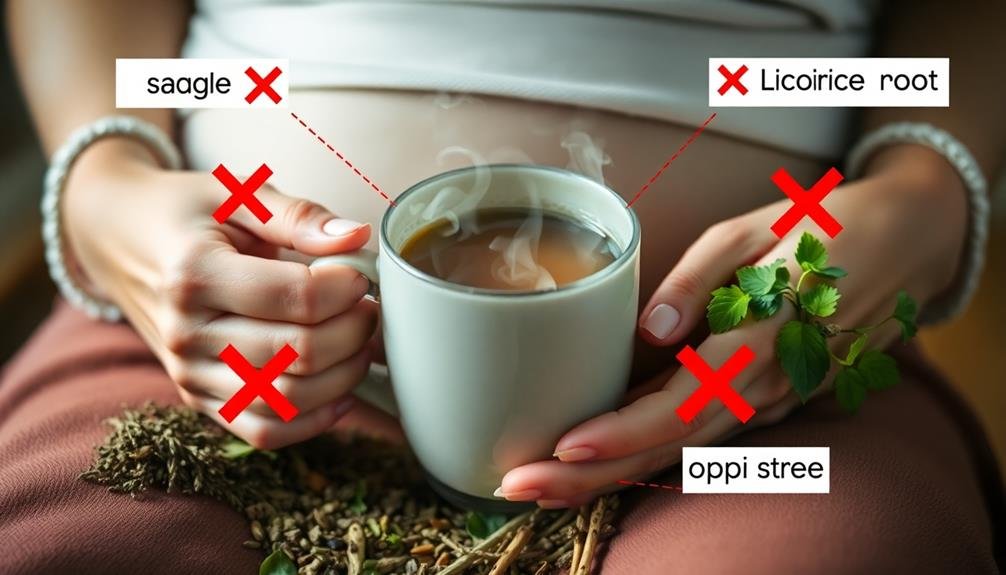During late pregnancy, you can safely enjoy a blend of herbal teas that includes red raspberry leaf, peppermint, ginger, and nettle leaf. Red raspberry leaf is known for toning the uterus and easing labor pains, while peppermint soothes digestive discomfort. Ginger can help alleviate nausea, and nettle leaf provides essential nutrients. Stick to 1-2 cups per day and always consult your healthcare provider before introducing new herbs. You can create your own blend or choose reputable brands offering pregnancy-safe options. Remember to avoid herbs like chamomile, licorice root, and hibiscus. There's more to discover about the benefits and precautions of herbal teas during pregnancy.
Understanding Pregnancy-Safe Herbal Teas

During pregnancy, it's crucial to be cautious about what you consume, including herbal teas. Not all herbal teas are safe for expectant mothers, as some can stimulate contractions or affect fetal development. To guarantee you're making safe choices, familiarize yourself with pregnancy-approved herbal teas.
Generally, herbal teas considered safe during pregnancy include ginger, peppermint, and red raspberry leaf. Ginger tea can help alleviate morning sickness and nausea, while peppermint tea may soothe digestive discomfort. Red raspberry leaf tea is often recommended in the third trimester to prepare the uterus for labor.
However, you should avoid teas containing chamomile, licorice root, and hibiscus, as they may have adverse effects on pregnancy. Always consult your healthcare provider before introducing new herbal teas into your diet. They can provide personalized advice based on your specific health needs and pregnancy progress.
When selecting herbal teas, opt for reputable brands and organic options to minimize exposure to pesticides. Steep your tea for the recommended time and avoid consuming excessive amounts.
Benefits of Herbal Tea During Pregnancy
Now that you're familiar with pregnancy-safe herbal teas, let's explore their benefits. During pregnancy, herbal teas can offer natural relief from common discomforts and support your overall well-being. They're an excellent way to stay hydrated, which is essential for both you and your baby's health.
Certain herbal teas can help alleviate morning sickness and nausea, particularly ginger and peppermint. These teas may also aid digestion and reduce heartburn, common issues in late pregnancy.
Chamomile tea can promote relaxation and improve sleep quality, which becomes increasingly important as your due date approaches.
Some herbal teas, like red raspberry leaf, are believed to tone the uterus and prepare it for labor. Others, such as nettle leaf, can provide essential nutrients like iron and calcium.
Rooibos tea is rich in antioxidants and can boost your immune system.
Herbal teas can also serve as a calming ritual, helping you manage stress and anxiety. They're a caffeine-free alternative to coffee, allowing you to enjoy a warm, comforting beverage without the potential side effects of excessive caffeine intake during pregnancy.
Red Raspberry Leaf Tea

Red raspberry leaf tea is a popular choice for pregnant women due to its potential benefits during late pregnancy.
You'll find that this herb may help tone your uterus, ease labor pains, and reduce the risk of postpartum hemorrhage.
To prepare, steep 1-2 teaspoons of dried leaves in hot water for 10 minutes, and aim for 1-3 cups daily in your third trimester, but always consult your healthcare provider first.
Benefits During Pregnancy
Throughout pregnancy, red raspberry leaf tea offers numerous benefits for expectant mothers. This herbal tea is known to strengthen the uterus, potentially leading to easier labor and delivery. You'll find that it's rich in vitamins and minerals, including iron, calcium, and magnesium, which support your body's increased nutritional needs during pregnancy.
Red raspberry leaf tea may help reduce morning sickness and nausea, common discomforts in early pregnancy. As you progress into later trimesters, it can alleviate leg cramps and promote better sleep. The tea's high antioxidant content supports your immune system, helping you ward off infections.
Regular consumption of this tea might decrease the likelihood of pregnancy complications such as preeclampsia and postpartum hemorrhage. It's also believed to improve the effectiveness of contractions during labor, potentially shortening the duration of childbirth.
Some women report that red raspberry leaf tea helps tone the pelvic floor muscles, which can be beneficial for postpartum recovery. However, always consult your healthcare provider before adding any herbal supplement to your pregnancy diet, as individual needs and health conditions vary.
Preparation and Dosage
When it comes to preparing red raspberry leaf tea, you'll find the process straightforward and simple. Start by using 1-2 teaspoons of dried red raspberry leaves per cup of boiling water.
Steep the leaves for 10-15 minutes, then strain and enjoy. You can drink it hot or cold, and even add honey or lemon for flavor if desired.
For dosage, it's best to start slowly and gradually increase your intake. Begin with one cup per day in your third trimester, around 32 weeks.
If you tolerate it well, you can increase to 2-3 cups daily. However, it's essential to consult your healthcare provider before adding any herbal tea to your pregnancy routine.
Some midwives recommend a stronger brew called "labor tea" in the final weeks of pregnancy.
To make this, use 1 ounce of dried leaves per pint of boiling water and steep for 30 minutes.
Drink this stronger tea in smaller amounts, such as 1/2 cup, 3-4 times daily.
Peppermint Tea for Digestive Comfort
Peppermint tea can be a soothing addition to your late pregnancy tea blend.
You'll find it helpful in relieving nausea and indigestion, common discomforts during the final trimester.
While it's safe to consume in moderation, this cooling and invigorating beverage offers a pleasant change from other pregnancy teas.
Relieves Nausea and Indigestion
A common discomfort in late pregnancy, nausea and indigestion can be effectively relieved with peppermint tea. This invigorating herbal brew contains menthol, which has natural antispasmodic properties that help relax your digestive system and ease stomach discomfort.
When you're experiencing pregnancy-related nausea, sipping on peppermint tea can provide quick relief. It works by calming the stomach muscles and reducing bloating, which often contributes to feelings of nausea. Additionally, the tea's cooling effect can help settle an upset stomach and alleviate the queasiness associated with morning sickness.
For indigestion, peppermint tea acts as a natural remedy by promoting healthy digestion. It stimulates the production of bile, which aids in breaking down fats and improves overall digestive function. This can be particularly helpful in late pregnancy when your growing baby puts pressure on your stomach, potentially causing acid reflux and heartburn.
To enjoy the benefits, steep a peppermint tea bag in hot water for 5-10 minutes. You can drink it warm or let it cool and serve over ice for a revitalizing alternative.
However, if you're prone to heartburn, consult your healthcare provider before consuming peppermint tea regularly, as it may exacerbate symptoms in some cases.
Safe in Moderation
While peppermint tea offers numerous benefits for digestive comfort during late pregnancy, it's important to consume it in moderation. You should limit your intake to 1-2 cups per day to avoid any potential side effects. Excessive consumption may lead to heartburn or acid reflux, especially if you're prone to these conditions.
When brewing peppermint tea, use fresh or dried peppermint leaves rather than pre-packaged tea bags, which may contain additives. Steep the leaves in hot water for 5-10 minutes, depending on your desired strength. You can also add a slice of lemon or a touch of honey for extra flavor and benefits.
Remember to consult your healthcare provider before incorporating peppermint tea into your pregnancy diet, especially if you have any pre-existing medical conditions or are taking medications. They can advise you on the appropriate amount and frequency of consumption based on your individual needs.
If you experience any adverse reactions after drinking peppermint tea, such as increased nausea or abdominal discomfort, discontinue use and speak with your doctor. Always listen to your body and prioritize your health and the well-being of your baby.
Cooling and Refreshing
One of the most appealing attributes of peppermint tea is its cooling and invigorating nature, particularly beneficial during late pregnancy. As your body temperature rises and you experience discomfort, peppermint tea can provide a rejuvenating respite.
It's known for its ability to soothe an upset stomach and alleviate nausea, common issues in the later stages of pregnancy.
When you brew peppermint tea, you'll notice its invigorating aroma, which can help combat fatigue and boost your mood. The menthol in peppermint has a natural cooling effect, offering relief from hot flashes and night sweats that often accompany pregnancy.
You'll find that sipping on this herbal infusion can also help clear your sinuses and ease any respiratory discomfort.
For ideal refreshment, try brewing a strong cup of peppermint tea and letting it cool. You can then pour it over ice for a revitalizing iced tea. Adding a squeeze of lemon or a touch of honey can enhance both the flavor and the tea's soothing properties.
Remember to consult your healthcare provider about the appropriate amount to consume during pregnancy.
Ginger Tea for Nausea Relief

Many pregnant women turn to ginger tea as a natural remedy for nausea relief during late pregnancy. This spicy root has been used for centuries to combat morning sickness and general queasiness.
You'll find that ginger tea can be particularly effective in your third trimester when heartburn and indigestion often intensify.
To prepare ginger tea, you can use fresh ginger root or pre-packaged ginger tea bags. If you're using fresh ginger, simply slice a few pieces and steep them in hot water for 5-10 minutes. You can add a touch of honey or lemon for flavor if desired.
It's crucial to recognize that while ginger is generally considered safe during pregnancy, you should consume it in moderation. Aim for no more than 1 gram of ginger per day, which is equivalent to about one cup of strong ginger tea.
If you're taking any medications or have concerns about your pregnancy, it's always best to consult with your healthcare provider before incorporating ginger tea into your routine. They can advise you on the appropriate amount and frequency based on your individual needs and health status.
Chamomile Tea: Pros and Cons
Throughout pregnancy, chamomile tea has been a popular choice for expectant mothers seeking relaxation and relief from common discomforts. This caffeine-free herbal tea offers several potential benefits, including reduced anxiety, improved sleep quality, and relief from indigestion. Chamomile's anti-inflammatory properties may also help alleviate minor aches and pains associated with pregnancy.
However, there are some concerns about consuming chamomile tea during late pregnancy. While generally considered safe in moderation, large amounts of chamomile may increase the risk of uterine contractions and preterm labor. If you're prone to allergies, particularly to plants in the daisy family, you should avoid chamomile tea altogether.
Another consideration is that chamomile can interact with certain medications, including blood thinners and some antidepressants. If you're taking any prescription drugs, consult your healthcare provider before adding chamomile tea to your diet.
To enjoy the benefits of chamomile tea safely during late pregnancy, limit your intake to one or two cups per day. Always choose high-quality, organic chamomile tea to minimize exposure to pesticides and other harmful substances.
If you experience any unusual symptoms after drinking chamomile tea, discontinue use and consult your doctor immediately.
Nettle Leaf Tea for Nutrients

While chamomile tea offers relaxation benefits, nettle leaf tea packs a powerful nutritional punch for expectant mothers in late pregnancy.
You'll find that nettle leaf is rich in significant nutrients like iron, calcium, and vitamins A, C, and K. These nutrients are imperative for supporting your body and your growing baby during the final trimester.
Iron, in particular, is essential for preventing anemia, a common concern in pregnancy. The high calcium content in nettle leaf can help strengthen your bones and support your baby's skeletal development. Vitamin K aids in blood clotting, which is important for both you and your newborn.
However, it's important to consume nettle leaf tea in moderation. While generally considered safe, excessive consumption may lead to mild side effects such as stomach upset or allergic reactions. Always consult your healthcare provider before adding any herbal tea to your pregnancy diet.
To maximize the benefits, you can steep nettle leaf tea for 5-10 minutes in hot water.
Consider blending it with other pregnancy-safe herbs like red raspberry leaf or peppermint for a more flavorful and diverse nutrient profile.
Creating Your Own Pregnancy Blend
A personalized herbal tea blend can cater to your specific needs during late pregnancy. By combining safe, pregnancy-friendly herbs, you'll create a nourishing and comforting drink. Start with a base of red raspberry leaf, which is known for its uterine-toning properties. Add nettle leaf for its rich nutrient profile and ginger root to help with nausea and digestion.
Consider including these herbs in your pregnancy blend:
- Chamomile: For relaxation and sleep support
- Lemon balm: To ease anxiety and promote calmness
- Oatstraw: For its mineral content and stress-reducing properties
- Rosehip: For vitamin C and immune support
- Peppermint: To aid digestion and relieve headaches
When creating your blend, use equal parts of each herb or adjust ratios based on your preferences. Always consult with your healthcare provider before incorporating new herbs into your diet.
Start with small amounts and observe how your body responds. Steep your blend for 5-10 minutes in hot water, strain, and enjoy. You can make larger batches to store in airtight containers for convenience.
Remember to rotate your herbs occasionally to benefit from a variety of nutrients and flavors throughout your pregnancy.
Herbs to Avoid While Pregnant

As you explore herbal tea blends for late pregnancy, it's equally important to know which herbs to steer clear of. Some herbs can be harmful to your developing baby or may induce labor prematurely. Avoid herbs like black cohosh, blue cohosh, and dong quai, which can stimulate uterine contractions.
Steer clear of chamomile, as it may increase the risk of miscarriage or preterm labor. You'll also want to avoid herbs with high levels of caffeine, such as guarana and yerba mate. These can cause increased heart rate and blood pressure in both you and your baby.
Licorice root should be avoided, as it may lead to preterm labor and affect fetal brain development. Steer clear of pennyroyal, which can be toxic to the liver and potentially cause miscarriage.
Other herbs to avoid include sage, which can reduce milk supply, and St. John's Wort, which may interact with medications and increase photosensitivity.
Always consult your healthcare provider before consuming any herbal teas during pregnancy, as they can advise you on safe options tailored to your specific needs and health conditions.
Frequently Asked Questions
Can I Drink Herbal Teas From Cafes During Pregnancy?
You should be cautious about drinking herbal teas from cafes during pregnancy. It's best to consult your doctor first, as some herbs can be harmful. Stick to well-known, pregnancy-safe options like ginger or peppermint tea when possible.
How Many Cups of Herbal Tea Are Safe per Day?
You should limit your herbal tea intake to 1-2 cups per day during pregnancy. It's best to consult your healthcare provider, as some herbs may not be safe. Stick to well-known, pregnancy-safe teas when possible.
Are There Any Herbal Teas That Can Induce Labor?
While some teas like raspberry leaf, chamomile, and evening primrose are believed to induce labor, there's limited scientific evidence. You shouldn't use them without consulting your doctor. They can have side effects and interact with medications.
Can I Mix Herbal Teas With Regular Black or Green Tea?
You can mix herbal teas with black or green tea. It's a great way to create unique flavors and enjoy the benefits of both. Just be mindful of caffeine content and any potential interactions between ingredients.
Are There Specific Herbal Teas to Avoid During the First Trimester?
You should avoid certain herbal teas during your first trimester. Steer clear of those containing chamomile, licorice root, and peppermint. It's best to consult your healthcare provider for a complete list of safe and unsafe herbal teas.
In Summary
You've explored several safe herbal tea options for late pregnancy. Remember, it's essential to consult your healthcare provider before adding any new teas to your routine. Always choose organic, caffeine-free blends and steep them properly. You can create your own pregnancy-safe blend using the herbs discussed, but don't forget to avoid potentially harmful ones. Enjoy your tea in moderation, and listen to your body's response. Stay hydrated and savor this special time!





Leave a Reply